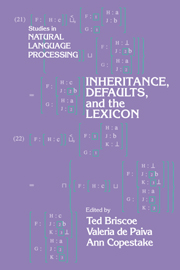
-
Select format
-
- Publisher:
- Cambridge University Press
- Publication date:
- April 2010
- January 1994
- ISBN:
- 9780511663642
- 9780521430272
- 9780521028059
- Dimensions:
- (216 x 138 mm)
- Weight & Pages:
- 0.535kg, 308 Pages
- Dimensions:
- (228 x 152 mm)
- Weight & Pages:
- 0.467kg, 308 Pages
You may already have access via personal or institutional login
Book description
The lexicon is now a major focus of research in computational linguistics and natural language processing (NLP), as more linguistic theories concentrate on the lexicon and as the acquisition of an adequate vocabulary has become the chief bottleneck in developing practical NLP systems. This collection describes techniques of lexical representation within a unification-based framework and their linguistic application, concentrating on the issue of structuring the lexicon using inheritance and defaults. Topics covered include typed feature structures, default unification, lexical rules, multiple inheritance and non-monotonic reasoning. The contributions describe both theoretical results and implemented languages and systems, including DATR, the Stuttgart TFS and ISSCO's ELU. This book arose out of a workshop on default inheritance in the lexicon organized as a part of the Esprit ACQUILEX project on computational lexicography. Besides the contributed papers mentioned above, it contains a detailed description of the ACQUILEX lexical knowledge base (LKB) system and its use in the representation of lexicons extracted semi-automatically from machine-readable dictionaries.
Reviews
‘A very valuable description … should be available in all centres of artificial intelligence.’
Source: Artificial Intelligence Review
Contents
Metrics
Altmetric attention score
Full text views
Full text views help Loading metrics...
Loading metrics...
* Views captured on Cambridge Core between #date#. This data will be updated every 24 hours.
Usage data cannot currently be displayed.
Accessibility standard: Unknown
Why this information is here
This section outlines the accessibility features of this content - including support for screen readers, full keyboard navigation and high-contrast display options. This may not be relevant for you.
Accessibility Information
Accessibility compliance for the PDF of this book is currently unknown and may be updated in the future.


